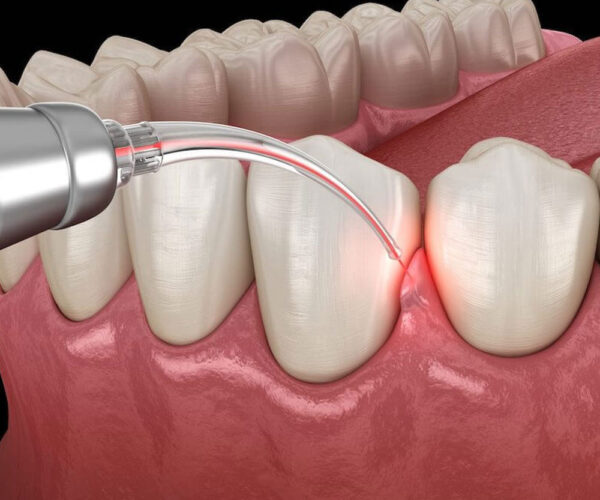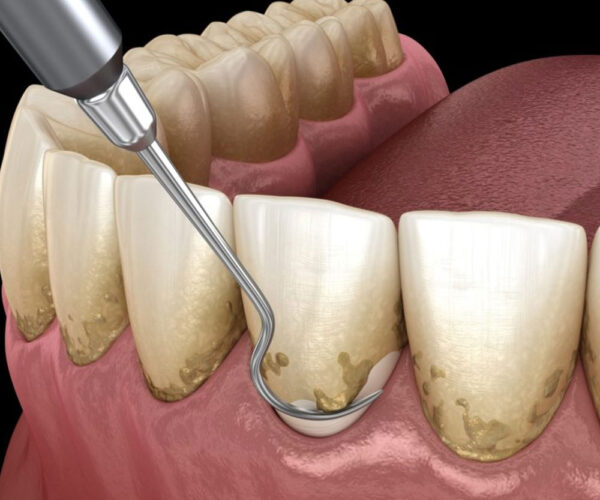Gum Disease Treatment in Brentwood
Gum disease is a common condition, but it can have severe consequences for your teeth if left untreated. For gum disease treatment in Brentwood, schedule a consultation with our office.
At Marsh Creek Dental, we are dedicated to providing comprehensive gum disease treatment to all our patients. Gum disease can be prevented with good hygiene, and with early detection and treatment, it is easily reversible. If you are suffering from symptoms of gum disease, let us help you restore your health and your smile today.
What is Gum Disease?
Gum disease is a progressive condition that occurs in two stages. The first, called gingivitis, is primarily caused by poor oral hygiene. Other health and lifestyle factors can increase your risk of developing gum disease. These factors include family history, smoking, vitamin C deficiency, old age, and hormonal changes such as those during pregnancy or menopause. Conditions such as diabetes, rheumatoid arthritis and Crohn’s disease can also increase your risk.
In the first stage, the bacteria from built-up plaque and tartar begins attacking your gums and cause them to recede. Untreated, gum disease will advance to periodontitis. Once it reaches this critical stage, the bacterial infection spreads to the rest of your mouth. The infection attacks your tooth ligaments, tooth roots and jawbone as your gums recede. This can lead to tooth loss and the deterioration of jawbone tissue.
What are the Symptoms of Gum Disease?
The common symptoms of gingivitis include:
- Puffy or swollen gums
- Dark red gums
- Bleeding gums when you brush or floss
- Bad breath
- Receding gums
If gingivitis advances to periodontitis, your symptoms may include:
- New spaces growing between your teeth
- Bright red, dark red, or purple gums
- Pain when chewing
- Loose teeth
- Pus between your teeth
- Receding gums and exposed tooth roots
- Changes in how your teeth fit together when biting or chewing
How Do You Treat Gum Disease?
Our practice offers a variety of gum disease treatments, including:
- Scaling and Root Planing: Dental scaling is a deep cleaning procedure performed to remove hardened plaque and tartar from your enamel. We will then perform a root planing to smooth the surface of your tooth root, preventing bacteria from adhering to it and causing future decay.
- Dental Crown Lengthening: Crown lengthening is performed to remove excess gum tissue and repair the decayed or damaged tooth underneath. We may also perform a crown lengthening to enhance the appearance of your teeth if you have a “gummy” smile.
- Gingivectomy: Gingivectomy is a surgical procedure to remove diseased gum tissue. The remaining healthy tissue is then reattached around your teeth.
- Laser Treatment: This is a minimally invasive alternative to removing infected gum tissue. Laser treatment requires no scalpels or other surgical instruments and requires a shorter recovery period.
- Pocket Reduction: This surgical operation is performed to clean out the spaces between your receded gums and teeth (called periodontal pockets) and remove the infection-causing bacteria.
- Bone Grafting: A surgical procedure performed to restore and regenerate bone tissue resulting from periodontal disease. Bone grafting can also be performed to provide a stable base for one or more dental implants.


Most popular and trending Gum Disease Questions
Mild cases of gum disease can usually be treated by maintaining a good level of oral hygiene. This includes brushing your teeth at least twice a day and flossing regularly. You should also make sure you attend regular dental check-ups.
You can’t cure it because once you lose structural support around your teeth, you don’t usually get all of it back. However, periodontal treatment can reduce infection and rebuild your bone and tissue to some degree. Another factor is genetics. There are many different types of oral bacteria.
While it’s possible to live with gum disease, the condition can impact your overall health if left untreated. Chronic inflammation from gum disease has been linked to increased risks of cardiovascular issues, diabetes, and respiratory problems.
